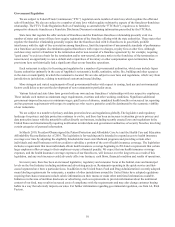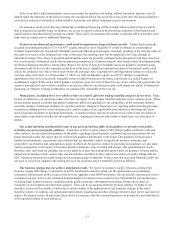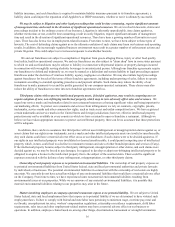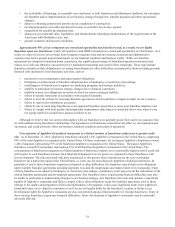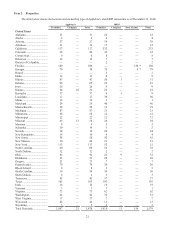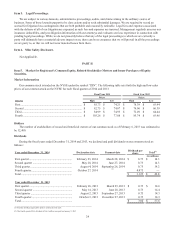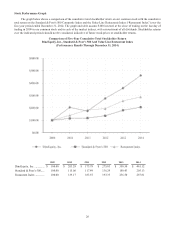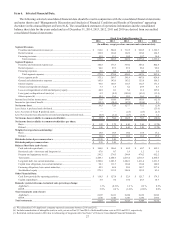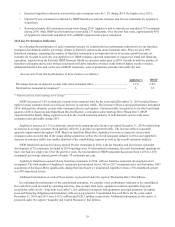IHOP 2014 Annual Report Download - page 39
Download and view the complete annual report
Please find page 39 of the 2014 IHOP annual report below. You can navigate through the pages in the report by either clicking on the pages listed below, or by using the keyword search tool below to find specific information within the annual report.20
associated with our brands. Franchisees and other licensees may refer to our intellectual property improperly in
communications, resulting in the weakening of the distinctiveness of our intellectual property. There can be no assurance that
the franchisees or other licensees will not take actions that could have a material adverse effect on the Applebee's or IHOP
intellectual property.
In addition, even if the licensee product suppliers, manufacturers, distributors, or advertisers observe and maintain the
quality and integrity of our intellectual property assets in accordance with the relevant license agreement, any product
manufactured by such suppliers may be subject to regulatory sanctions and other actions by third parties which can, in turn,
negatively impact the perceived quality of our restaurants and the overall goodwill of our brands, regardless of the nature and
type of product involved. Any such sanctions or actions could reduce restaurant revenues and corresponding franchise
payments to us.
We are heavily dependent on information technology and any material failure of that technology could impair our
ability to efficiently operate our business. We rely heavily on information systems across our operations, including, for
example, point-of-sale processing in our restaurants, management of our supply chain, collection of cash, payment of
obligations and various other processes and procedures. Our ability to efficiently manage our business depends significantly on
the reliability and capacity of these systems. The failure of these systems to operate effectively, problems with maintenance,
upgrading or transitioning to replacement systems, fraudulent manipulation of sales reporting from our restaurants resulting in
loss of sales and royalty payments, or a breach in security of these systems could be harmful and cause delays in customer
service and reduce efficiency in our operations. Significant capital investments might be required to remediate any problems.
As part of our marketing efforts, we rely on search engine marketing and social media platforms to attract and retain
guests. These efforts may not be successful, and pose a variety of other risks, as discussed above under the heading: “A failure
to develop and implement innovative marketing and guest relationship initiatives, ineffective or improper use of social media or
other marketing initiatives, and increased advertising and marketing costs, could adversely affect our business results.”
The occurrence of cyber incidents, or a deficiency in our cybersecurity, could negatively impact our business by causing
a disruption to our operations, a compromise or corruption of our confidential information, and/or damage to our employee
and business relationships, all of which could subject us to loss and harm our brands. A cyber incident is considered to be
any adverse event that threatens the confidentiality, integrity, or availability of our information resources. More specifically, a
cyber incident is an intentional attack or an unintentional event that can include gaining unauthorized access to systems to
disrupt operations, corrupt data, or steal confidential information about our customers, franchisees, vendors and employees. As
our reliance on technology has increased, so have the risks posed to our systems, both internal and those we have outsourced.
Three primary risks that could directly result from the occurrence of a cyber incident include (i) exposure of confidential data
about our customers, franchisees, vendors and employees, (ii) damage to the reputation of our brands and (iii) damage to our
relationship with our franchisees.
Our use of personally identifiable information is regulated by foreign, federal and state laws, as well as by certain third-
party agreements. If our security and information systems are compromised or if our employees or franchisees fail to comply
with these laws and regulations, and this information is obtained by unauthorized persons or used inappropriately, it could
adversely affect our reputation and could disrupt our operations and result in costly litigation, judgments, or penalties resulting
from violation of federal and state laws and payment card industry regulations. As privacy and information security laws and
regulations change, we may incur additional costs to ensure that we remain in compliance with those laws and regulations.
Our inability or failure to execute on a comprehensive business continuity plan following a major natural disaster such
as an earthquake, tornado or man-made disaster, including terrorism, at our corporate facilities could materially adversely
impact our business. Our corporate systems and processes and corporate support for our restaurant operations are handled
primarily at our two restaurant support centers. We have disaster recovery procedures and business continuity plans in place to
address most events of a crisis nature, including earthquakes, tornadoes and other natural or man-made disasters, and back up
and off-site locations for recovery of electronic and other forms of data and information. However, if we are unable to fully
implement our disaster recovery plans, we may experience delays in recovery of data, inability to perform vital corporate
functions, tardiness in required reporting and compliance, failures to adequately support field operations and other breakdowns
in normal communication and operating procedures that could have a material adverse effect on our financial condition, results
of operation and exposure to administrative and other legal claims.
Our business depends on our ability to attract and retain talented employees. Our business is based on successfully
attracting and retaining talented employees. The market for highly skilled employees and leaders in our industry is extremely
competitive. If we are less successful in our recruiting efforts, or if we are unable to retain key employees, our ability to
develop and deliver successful products and services may be adversely affected. Effective succession planning is also important


